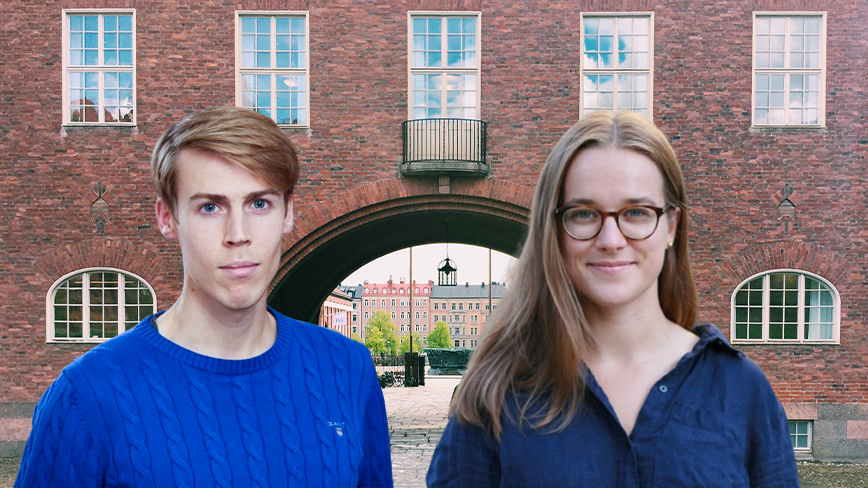“We make sure that the doctoral students' terms are not forgotten”

We talked to Joel Kronborg and Jura Miniotaite, chair and vice-chair of the PhD Council, who are currently working hard to protect the doctoral students interests in the relocation of KTH Kista.
The PhD council works with the PhD chapter's board to maximise the influence of doctoral students at KTH. The council members have different focus areas and are elected at the council's annual meetings, where all the school's doctoral students are invited and have the right to vote.
The PhD Council is now led by recently appointed Joel Kronborg and Jura Miniotaite, who explain why they chose to get involved.
“Because it is important to connect students. You are often alone as a doctoral student, and supporting the doctoral students is important. There are so many of us, but it can be so lonely,” says Jura Miniotaite, vice chair.
Chairman Joel Kronborg continues:
“I want to work on the internal structure of the council. For example, how we communicate, introduce new members, and handle handovers.”
Defending the interests of doctoral students
One of the PhD Council’s most important tasks is to represent the doctoral students in the working groups and councils at the school.
One of these working groups is, for example, the highly topical project group for the relocation of KTH Kista.
“A concrete example is that we represent and defend the interests of doctoral students in the relocation of Campus Kista. If, for example, the move delays the doctoral students' work, they should be able to receive compensation,” says Joel Kronborg.
“We make sure to remind them of our specific conditions and ensure they are not forgotten,” adds Jura Miniotaite.
One of the PhD Council's most important ongoing initiatives is the work to ensure that doctoral students can learn Swedish more easily.
“We have been working for two years to ensure that all doctoral students have the right to include a Swedish course in their programme that gives higher education credits. Recently, was decided that the individual study plans for all programmes at EECS will allow up to 6 higher education credits for languages. The next step is to ensure a suitable Swedish course for doctoral students,” says Jura Miniotaite.
Today, doctoral students are referred to the course "Swedish for employees", which does not give any credits, and the courses that do give credits are not open to doctoral students.
"It just felt wrong"
Both have tried to work in the industry but chose to apply for a doctoral position at KTH for different reasons.
“I studied media technology at KTH and then worked as a developer, but it felt wrong. Then I applied for a PhD position I didn't get, but they recommended another position that suited me well. I am now researching AI and robotics,” says Jura Miniotaite.
“I studied technical physics in Lund and started as a programmer. But I wanted to do more math and physics, which I'm doing now as a doctoral student while using my programming skills. I am now working on simulating blood flow in the heart,” says Joel Kronborg.
Tips for new doctoral students
Jura and Joel give their best tips to new doctoral students to get the most out of their experience at KTH:
- Ask many questions to supervisors and at conferences. It would help if you practised this to get comfortable with it.
- Take an interest in other people's research.
- Take the opportunity to mingle a lot in all contexts.
- Get involved in the PhD chapter.
- If you are not from Sweden, try things you don't do in other countries, such as going on a skiing trip or taking a cold bath.
